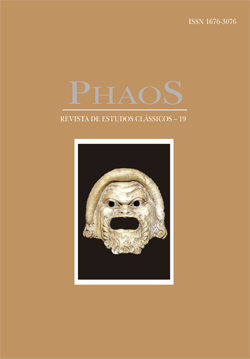Abstract
This paper is dedicated to the prologue of the comedy Andria of Terence and aims to demonstrate its insertion in the universe of Terencian fiction, pointing in it both conventions typical of Terencian and Roman comedy, as well as its relations with the plot of the play. The prologue reveals the presence of a metadramatic illusion, which has an effect on the image of both the Terencian public, the poet and the actor which enunciate the prologue. Such metadramatic ilusion is elaborated since that first composition.
References
BEARE, W. Contaminatio. In: CR 9, 1959, pp. 7-11.
BEARE, W. The Roman Stage - a History of Roman Drama at the time of Republic. London: Methuen& Co. Ltd, 1964.
BROWN, P. Actors and actor-managers at Rome in the time of Plautus and Terence. In: EASTERLING, P. E.; HALL E. (eds.): Greek and Roman actors: aspects of an ancient profession. Cambridge: Cambridge Univ. Press, 2002.
BROTHERS, A. J. The construction of Terence’s Heautontimorumenos, CQ, XXX, 1980.
CARDOSO, I. T. Engano e ilusão em Plauto. In : Z. A. Cardoso ; A. S. Duarte (org.) Estudos sobre o teatro antigo, São Paulo: Alameda, 2010, pp. 95-126.
COSTA, L. N. da; PLAUTO. Anfitrião. Tradução, introdução e notas de Lilian Nunes da Costa. Campinas: Mercado de letras, 2013.
CHRISTENSON, D. M. (ed.) Plautus Amphitruo. Cambridge: Cambridge University Press, 2000.
DUARTE, A. da S. Cenas de reconhecimento na poesia grega. Campinas: Editora da Unicamp, 2012.
EHRMAN, R. Terentian Prologues and the Parabases of Old Comedy. Latomus, 44(2), 1985, 370-376.
FABIA, P. Les prologues de Térence. Paris: Ernest Thorin, 1888.
FANTHAM, E. Terence, Diphilus and Menander. A reexamination of Terence, Adelphoe, act ii. Philologos, CXII, 1968, pp. 196-216.
FANTHAM, E. Orator et actor, in: EASTERLING, P.; HALL, E. (orgs). Atores gregos e romanos: aspectos de uma antiga profissão. Trad. Raul Fiker. São Paulo: Odysseus, 2008, pp. 425-442.
FOCARDI, G. Linguaggio forense nei prologhi terenziani. SIFC XLIV, 1972, pp. 55-88.
FOCARDI, G. Lo stile oratorio nei prologhi terenziani. SIFC L, 1978, pp. 70-89.
GELHAUS, H. Die prologe des Terenz. Eine Erklärung nach den Lehren von der invention und disposition. Heidelberg: Winter, 1972
GERMANY, R. Andria. In: AUGOUSTAKIS, A.; TRAILL, A. (eds.) A Companion to Terence. Oxford: Wiley- Blackwell, 2013, pp. 225-242.
GILULA, D. The first realistic roles in European theatre: Terence’s prologues. QUCC 62, 1989, pp. 95-106.
GOLDBERG, S. M. Terence, Cato, and the Rhetorical Prologue. CP 78, 1983, pp. 198-211.
GONÇALVES, R. T. Comédia Latina: A tradução como reescrita do gênero. PhaoS n. 9, 2009, pp. 117-142.
GOWERS E. The plot thickens: hidden outlines in Terence prologues. Ramus 33, 2004, pp. 150-66.
HUNTER, R. L. The new comedy of Greece and Rome. Cambridge: University Press, 1989.
KAUER, R.; LINDSAY, W. M. (eds.) TERENCE; Comoediae. New York, N.Y.: Oxford Univ. Press, [1957]. 329 (Oxford Classical Texts).
KUJORE, O. A Note on Contaminatio in Terênce. CPh 69, 1974, pp. 39-42.
LAZARO-BRAGION, A. da S. A fuga da Sogra: mulheres, poesia e humor em Hecyra. Dissertação de Mestrado. Unicamp: Campinas, 2016 (disponível em http://www.bibliotecadigital.unicamp.br/document/?code=000973291).
MAURICE, L. Contaminatio and Adaptation: the Modern Reception of Ancient Drama as an aid to understanding Roman Comedy. In: BAKOGIANNI,Anastasia (ed.), Dialogues with the Past (2): Reception Theory and Practice, Proceedings of the Reception of Ancient Greek and Roman Drama Conference, BICS Supplement series (London: ICS, 2013) 445-465.
PENWILL, J. L. The unlovely lover of Terence’s ‘Hecyra’. Ramus 33 (1-2), 2004, pp. 130-149.
RICOTTILLI, L. Due aspetti della anagnorisis in Terenzio. Dionysus ex machina V, 2014, pp. 114-127.
SHARROCK, A. Reading Roman comedy: Poetics and playfulness in Plautus and Terence. Cambridge: Cambridge Univ. Press, 2009.
SHIPP, G. P. (ed.) Terentius, A. P. Andria. Oxford: Oxford University Press, 1960.
VINCENT, H. Fabula stataria: Language and humor in Terence. In: A companion to Terence. Oxford: Wiley- Blackwell, 2013, pp. 69-89.
WESSNER, P. Donatus, Aelius: Aeli Donati commentvm Terenti (2 vols.), Stutgardiae: Teubner, 1963.

This work is licensed under a Creative Commons Attribution-NonCommercial-ShareAlike 4.0 International License.
Copyright (c) 2019 PhaoS - Revista de Estudos Clássicos

